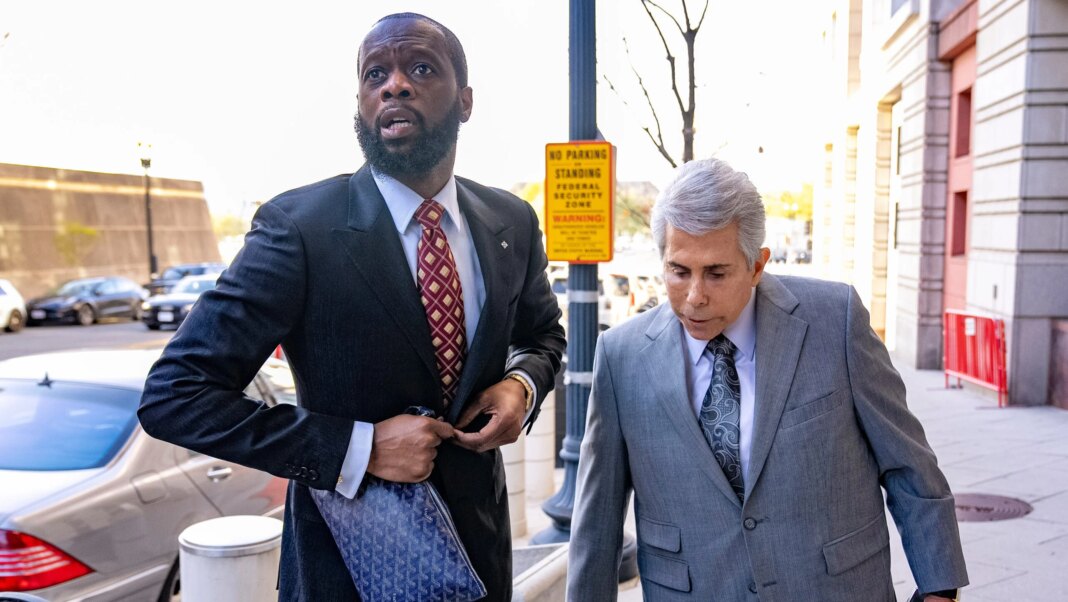Pras Michel’s 14-Year Sentence: A Look Into the Legal Storm
In a high-profile case that has captivated media attention, Prakazrel “Pras” Michel, renowned rapper and co-founder of the Grammy-winning hip-hop group Fugees, was sentenced to 14 years in prison. This decision came as a culmination of a complex legal battle involving allegations of illegally funneling foreign contributions to Barack Obama’s 2012 reelection campaign. The implications of this case extend far beyond the music industry and touch upon serious issues of political integrity and foreign influence.
The Charges Against Michel
In April 2023, a federal jury in Washington, D.C., found Michel guilty on ten counts, including conspiracy and acting as an unregistered agent of a foreign government. The courtroom drama included testimony from high-profile witnesses, notably actor Leonardo DiCaprio and former Attorney General Jeff Sessions. These testimonies highlighted the breadth of Michel’s alleged illegal activities and raised questions about foreign interference in American politics.
Sentencing and Justice Department’s Position
During the sentencing hearing, U.S. District Judge Colleen Kollar-Kotelly sentenced Michel to a substantial 14 years in prison. Prosecutors painted a grim picture of Michel’s actions, claiming he “betrayed his country for money” and lied with “unapologetic and unrelenting” determination. They pressed for a life sentence based on federal guidelines, arguing that such a punishment would properly reflect the severity of his crimes. The Justice Department emphasized the potential risks his actions posed to national security and the glaring greed that motivated him.
Defense Arguments
Michel’s defense attorney, Peter Zeidenberg, argued that the sentence was excessive and not proportional to the offense. Zeidenberg recommended a mere three-year sentence, suggesting that a life sentence was wildly disproportionate—typically reserved for heinous crimes like terrorism and drug trafficking. He contended that the Government’s approach could lead to “absurdly high” punishments, illustrating the flaws in sentencing guidelines.
The Role of Jho Low
Embedded in this case is the controversial figure of Malaysian billionaire Jho Low, who allegedly funneled over $120 million to Michel. Prosecutors claimed that Michel directed some of Low’s funds through straw donors to Obama’s campaign, effectively obscuring the foreign source of these contributions. Interestingly, Michel’s attorneys argued that Low’s primary motivation for the donations was personal; he wanted a photograph with then-President Obama, rather than any policy objective.
Witness Tampering and Trial Controversies
Adding layers to Michel’s legal troubles, prosecutors accused him of attempting to obstruct a Justice Department investigation related to Low. This included alleged witness tampering and perjury during the trial itself. Such aggressive tactics not only complicated Michel’s defense but also painted a troubling portrait of his intentions and actions throughout the investigation.
The Appeal Process and Use of Technology
Following his sentencing, Michel announced plans to appeal his conviction and sentence. However, his defense faced additional scrutiny due to an unconventional approach: the use of a generative AI program in crafting closing arguments. The judge ultimately rejected Michel’s request for a new trial, ruling that the use of AI and other procedural errors did not indicate a serious miscarriage of justice. This decision raises questions about the evolving role of technology in legal strategies and its implications for future cases.
Michel’s Musical Legacy
Before the legal turmoil, Michel was known primarily for his contributions to music. As a founding member of the Fugees alongside Lauryn Hill and Wyclef Jean, he enjoyed immense success in the 1990s, with the group capturing two Grammy Awards and selling tens of millions of albums worldwide. Their blend of hip-hop, soul, and reggae became iconic, reflecting cultural narratives intertwined with social issues.
Conclusion
As Pras Michel begins his sentence, the case serves as a stark reminder of the complexities involved in political campaigns and the potential vulnerabilities within the American political system. With appeals pending and discussions around the appropriateness of sentencing guidelines ongoing, this story is still unfolding, poised to raise important questions about justice, accountability, and the intersection of celebrity, wealth, and political influence.



